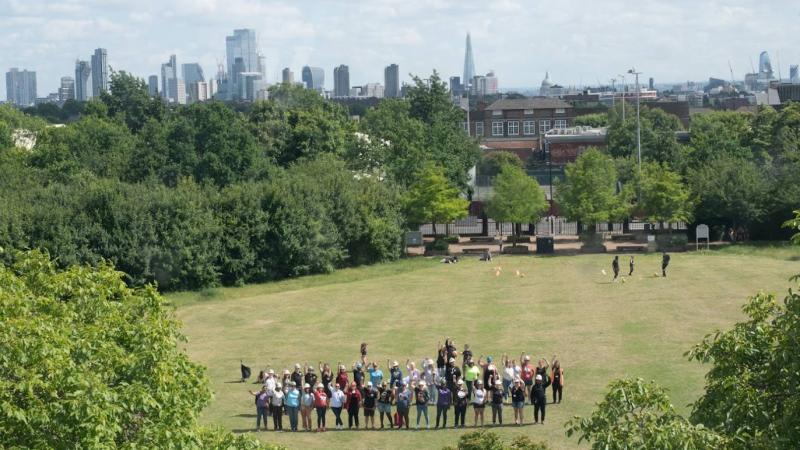The University’s Centre for the Study of the Production of the Built Environment hosted a delegation of 50 North American tradeswomen between 9-19 June 2022 to inspire more women in the UK and internationally to build careers in the construction trades.

The aim of the delegation was to galvanise support for greater inclusion of women in the construction sector and to express solidarity with women training and working in the industry. A special focus of support was on the redevelopment of the former Holloway Prison, the largest women’s prison in Europe, for housing above all social housing and a women’s building to honour the legacy of the site. Proposals for all the trainees and 30% of those employed on the site to be women have been taken up by Islington Council and the developer.
The delegation was organised in partnership with Tradeswomen Building Bridges (TBB), a network of North American women whose vision is to build transnational solidarity among women working in the trades, to learn about the lives and working conditions of tradeswomen in other parts of the world, and to share best practices for women gaining greater access to careers in the trades.
The University of Westminster has been leading the way for research into women in construction since the 1990s, with its well-renowned Centre for the Study of the Production of the Built Environment Research (ProBE), led by Co-directors Professor Linda Clarke and Professor Christine Wall, publishing and contributing to dozens of pieces of literature on women in construction worldwide, including several reports and a book titled ‘Women in Construction’ published in 2004.
The delegation follows on from Westminster’s great results in the Research Excellence Framework (REF) 2021, which saw the Impact Case Study ‘Celebrating and empowering women in construction’ rated at four-star level, meaning the research is world-leading in terms of its originality, significance and rigour.
The programme of activities began with a best practices workshop on 9 June hosted at Westminster’s Marylebone Campus. TBB presented four case studies of successful regional strategies in Canada and the United States where the percentage of women in the trades is now equal to or greater than 10%. The event shared strategies for success with UK construction industry stakeholders and gave them an opportunity for discussion and reflection on what might be useful for improving gender diversity in their area of work.
On 10 June, Westminster welcomed delegates from across the USA, Canada and Norway to a reception also at the Marylebone Campus. Westminster’s Vice-Chancellor and President Dr Peter Bonfield gave opening remarks and spoke about the University’s goal to become a movement for change, and to encourage students from diverse backgrounds to follow their dreams.
A weekend of activities followed in Islington with Reclaim Holloway, and the campaign around the redevelopment of the Holloway prison site named Community Plan for Holloway. These included a community picnic at Caledonian Park in Islington where the delegation met residents and local politicians, including Emily Thornberry MP, and spoke about what it is like being a woman in the construction trades, as well as a tour of the prison site and heritage walks. On 13 June Islington Council organised site visits, including to the Kings Cross Construction Skills Centre, and a reception in the Islington Town Hall.
The University also hosted a research forum on 14 June, sharing cutting-edge research on issues concerning women in construction, in particular procurement, empowerment and green construction. Members of the delegation together with UK and Europe-based academics, trade unionists and practitioners were all in attendance.
Some of the highlights of the week’s activities were visits to Thames Tideway’s offices, hosted by UK-based Women into Construction; the HS2 development and other construction sites, including UCL’s new global research centre for Neuroscience and Dementia; and Further Education Colleges. This culminated in a networking event in the Houses of Parliament hosted by Emily Thornberry MP and the Chartered Institute of Builders (CIOB). Then a weekend of networking with tradeswomen from across Europe followed hosted by Unite the Union.
Speaking about the success of the delegation, Professor Linda Clarke, Co-Director of ProBE, said: “The delegation has given a massive boost to the inclusion of women in the construction trades in Britain and the rest of Europe, showing how this can be achieved in all the different trades on site and cementing a global network to carry this forward through examples, including the redevelopment of Holloway Prison.”
Cassandra Klewicki, TBB leadership member, added: “The visit was a massive success. We got a lot of positive feedback from delegates. They gained a lot of skills and knowledge they will be able to take home. We also had some immediate instances of positive change as a result of our visit.”
Noreen Buckley, also part of TBB leadership, said: “This first international Tradeswomen conference was a success! Through partnership with the University of Westminster, TBB was able to connect with Tradeswomen and their allies throughout Europe and the Scandinavian countries. We learned from each other, we supported each other, we pushed that message that women can and should be doing the honourable work on building the world! The bridge between North America and the UK has been started and we look forward to strengthening our ties. "
Find out more about Professor Linda Clarke’s work.
Find out more about the work of TBB on their website.







